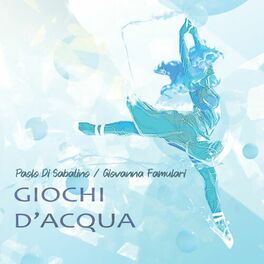
Soms vraag je je af waarom sommige musici zo weinig bekendheid genieten. Zoals de getalenteerde Italiaanse pianist Paolo Di Sabatino die samen met celliste Giovanna Famulari het bijzondere album Giochi d’Acqua opnam.
English version below
De Italiaanse pianist Paolo Di Sabatino (1970) studeerde op 20 jarige leeftijd af aan het Conservatorium van Bari en nam vier jaar later zijn debuut kwartet-album op, onder zijn eigen naam. Naast pianist is hij ook arrangeur en componist en schreef hij alle werken voor zijn laatste album Giochi d’Acqua (Waterspel). Deze CD nam hij op met Giovanna Famulari. Zij studeerde aan het Conservatorium Triëst cello, zang, piano en acteren. Van kinds af aan droomt zij van musiceren en acteren (wellicht daarom haar fascinatie voor hoeden), speelde in diverse films en werkte mee aan televisie- en radioprogramma’s.
In de muziek op Giochi d’Acqua staat weliswaar de piano centraal, maar het is de cello die het verschil maakt. Een instrument met een weergaloos mooi timbre, diepgang en breed sentiment. De cello geeft muziek de passende weemoed die ook op dit album goed tot zijn recht komt. Hoe ritmisch en vrolijk de composities ook zijn, de melancholie zit in de kern van de muziek. De stukken zijn melodisch, met thema’s die zich met gemak in je geheugen nestelen en daar rustig een week ronddartelen. Di Sabatino heeft een vlijmscherp touché met een strakke timing. Zijn muziek klinkt verzorgd en toch spontaan. Hij improviseert met een vanzelfsprekend gemak over de thema’s met hier en daar een modaal uitstapje dat de muziek onmiskenbaar richting jazz duwt. Hij wordt daarbij voluit ondersteund door het cellospel van Famulari die soms in haar eentje een heel orkest imiteert. De stukken hebben veelal een liederlijk karakter, soms leunend tegen het klassieke repertoire zoals in Strana Melodia waarin de cello een prachtig contra-punt speelt. Giochi d’Acqua is een album waar snel en langzaam werk elkaar om-en-om afwisselt. Mede hierdoor word je meegenomen op een melodisch gevarieerde reis: heerlijk ritmisch in Javier (tango), dansend in Danza, troostend en mijmerend in Elegia of samba-like in Cançao. Dat is dubbel lang genieten op dit redelijk korte album.
English version
Sometimes you wonder why some musicians enjoy so little fame. Such as the talented Italian pianist Paolo Di Sabatino, who recorded the special album Giochi d’Acqua together with cellist Giovanna Famulari.
Italian pianist Paolo Di Sabatino (1970) graduated from the Bari Conservatory at the age of 20 and recorded his debut quartet album four years later, under his own name. In addition to being a pianist, he is also an arranger and composer and wrote all the compositions for his latest album Giochi d’Acqua (Water Play). He recorded this CD with Giovanna Famulari. She studied cello, singing, piano and acting at the Trieste Conservatory. Since her childhood she has dreamed of making music and acting (perhaps therefore also her fascination for hats), played in various films and worked on television and radio programs.
Although the piano plays the central role in the music on Giochi d’Acqua, it is the cello that makes the difference. An instrument with an incomparably beautiful timbre, depth and broad sentiment. The cello gives music it’s wonderful melancholy that also gives this album a wide timbre. However, how rhythmic and cheerful the composition are, the melancholy stays at the heart of the music. The pieces are melodic, with themes that settle into your memory with ease, floating around there for a week or so. Di Sabatino has a sharp touché with tight timing. His music sounds fresh and spontaneous. He improvises with a natural ease on the themes with here and there a modal passage that unmistakably pushes the music towards jazz. He is fully supported in this by Famulari’s cello playing, who sometimes imitates an entire orchestra on her own. The pieces often have a song-like character, sometimes leaning against the classical repertoire, such as in Strana Melodia in which the cello plays a wonderful counter-point. Giochi d’Acqua is an album where fast and slow work alternates. Partly because of this, you will be taken on a melodically varied journey: wonderfully rhythmic in Javier (tango), dancing in Danza, comforting and musing in Elegia or samba-like in Cançao. That is double joy on this fairly short album.
- Paolo Di Sabatino / Giovanna Famulari: Giochi d’Acqua (EGEA Music / Xango)
© Mattie Poels.

Geen reacties